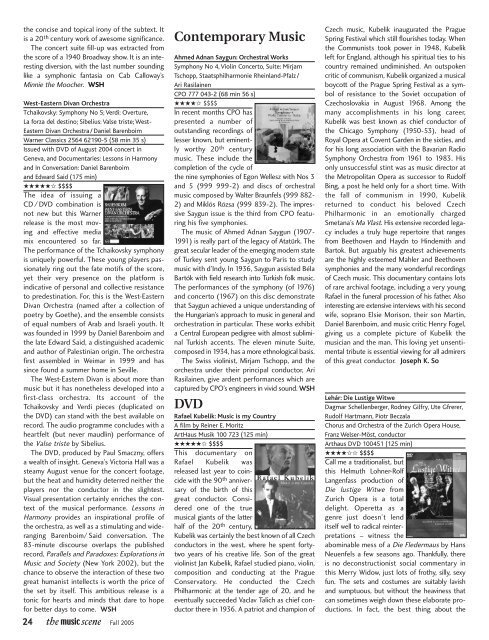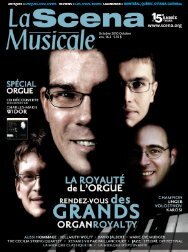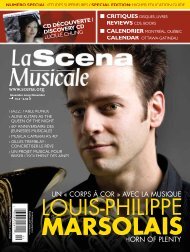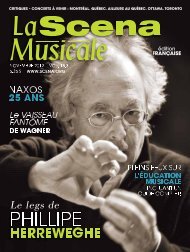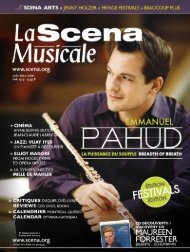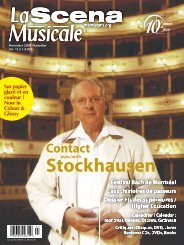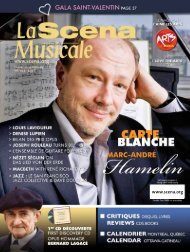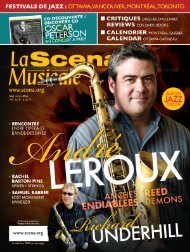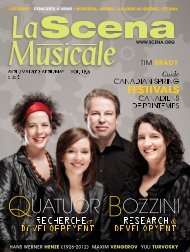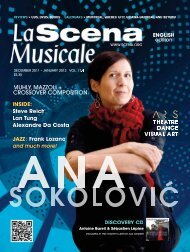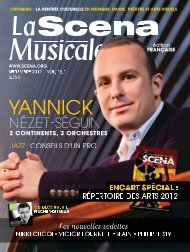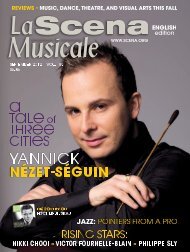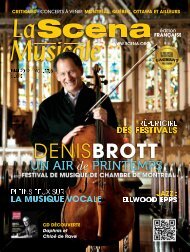Download - La Scena Musicale
Download - La Scena Musicale
Download - La Scena Musicale
You also want an ePaper? Increase the reach of your titles
YUMPU automatically turns print PDFs into web optimized ePapers that Google loves.
the concise and topical irony of the subtext. It<br />
is a 20 th century work of awesome significance.<br />
The concert suite fill-up was extracted from<br />
the score of a 1940 Broadway show. It is an interesting<br />
diversion, with the last number sounding<br />
like a symphonic fantasia on Cab Calloway’s<br />
Minnie the Moocher. WSH<br />
West-Eastern Divan Orchestra<br />
Tchaikovsky: Symphony No 5; Verdi: Overture,<br />
<strong>La</strong> forza del destino; Sibelius: Valse triste; West-<br />
Eastern Divan Orchestra / Daniel Barenboim<br />
Warner Classics 2564 62190-5 (58 min 35 s)<br />
Issued with DVD of August 2004 concert in<br />
Geneva, and Documentaries: Lessons in Harmony<br />
and In Conversation: Daniel Barenboim<br />
and Edward Said (175 min)<br />
★★★★★✩ $$$$<br />
The idea of issuing a<br />
CD / DVD combination is<br />
not new but this Warner<br />
release is the most moving<br />
and effective media<br />
mix encountered so far.<br />
The performance of the Tchaikovsky symphony<br />
is uniquely powerful. These young players passionately<br />
ring out the fate motifs of the score,<br />
yet their very presence on the platform is<br />
indicative of personal and collective resistance<br />
to predestination. For, this is the West-Eastern<br />
Divan Orchestra (named after a collection of<br />
poetry by Goethe), and the ensemble consists<br />
of equal numbers of Arab and Israeli youth. It<br />
was founded in 1999 by Daniel Barenboim and<br />
the late Edward Said, a distinguished academic<br />
and author of Palestinian origin. The orchestra<br />
first assembled in Weimar in 1999 and has<br />
since found a summer home in Seville.<br />
The West-Eastern Divan is about more than<br />
music but it has nonetheless developed into a<br />
first-class orchestra. Its account of the<br />
Tchaikovsky and Verdi pieces (duplicated on<br />
the DVD) can stand with the best available on<br />
record. The audio programme concludes with a<br />
heartfelt (but never maudlin) performance of<br />
the Valse triste by Sibelius.<br />
The DVD, produced by Paul Smaczny, offers<br />
a wealth of insight. Geneva’s Victoria Hall was a<br />
steamy August venue for the concert footage,<br />
but the heat and humidity deterred neither the<br />
players nor the conductor in the slightest.<br />
Visual presentation certainly enriches the context<br />
of the musical performance. Lessons in<br />
Harmony provides an inspirational profile of<br />
the orchestra, as well as a stimulating and wideranging<br />
Barenboim/ Said conversation. The<br />
83-minute discourse overlaps the published<br />
record, Parallels and Paradoxes: Explorations in<br />
Music and Society (New York 2002), but the<br />
chance to observe the interaction of these two<br />
great humanist intellects is worth the price of<br />
the set by itself. This ambitious release is a<br />
tonic for hearts and minds that dare to hope<br />
for better days to come. WSH<br />
24 Fall 2005<br />
Contemporary Music<br />
Ahmed Adnan Saygun: Orchestral Works<br />
Symphony No 4, Violin Concerto, Suite: Mirjam<br />
Tschopp, Staatsphilharmonie Rheinland-Pfalz /<br />
Ari Rasilainen<br />
CPO 777 043-2 (68 min 56 s)<br />
★★★★✩ $$$$<br />
In recent months CPO has<br />
presented a number of<br />
outstanding recordings of<br />
lesser known, but eminently<br />
worthy 20 th<br />
century<br />
music. These include the<br />
completion of the cycle of<br />
the nine symphonies of Egon Wellesz with Nos 3<br />
and 5 (999 999-2) and discs of orchestral<br />
music composed by Walter Braunfels (999 882-<br />
2) and Miklós Rózsa (999 839-2). The impressive<br />
Saygun issue is the third from CPO featuring<br />
his five symphonies.<br />
The music of Ahmed Adnan Saygun (1907-<br />
1991) is really part of the legacy of Atatürk. The<br />
great secular leader of the emerging modern state<br />
of Turkey sent young Saygun to Paris to study<br />
music with d’Indy. In 1936, Saygun assisted Béla<br />
Bartók with field research into Turkish folk music.<br />
The performances of the symphony (of 1976)<br />
and concerto (1967) on this disc demonstrate<br />
that Saygun achieved a unique understanding of<br />
the Hungarian’s approach to music in general and<br />
orchestration in particular. These works exhibit<br />
a Central European pedigree with almost subliminal<br />
Turkish accents. The eleven minute Suite,<br />
composed in 1934, has a more ethnological basis.<br />
The Swiss violinist, Mirjam Tschopp, and the<br />
orchestra under their principal conductor, Ari<br />
Rasilainen, give ardent performances which are<br />
captured by CPO’s engineers in vivid sound. WSH<br />
DVD<br />
Rafael Kubelik: Music is my Country<br />
A film by Reiner E. Moritz<br />
ArtHaus Musik 100 723 (125 min)<br />
★★★★★✩ $$$$<br />
This documentary on<br />
Rafael Kubelik was<br />
released last year to coincide<br />
with the 90 th anniversary<br />
of the birth of this<br />
great conductor. Considered<br />
one of the true<br />
musical giants of the latter<br />
half of the 20 th century,<br />
Kubelik was certainly the best known of all Czech<br />
conductors in the west, where he spent fortytwo<br />
years of his creative life. Son of the great<br />
violinist Jan Kubelik, Rafael studied piano, violin,<br />
composition and conducting at the Prague<br />
Conservatory. He conducted the Czech<br />
Philharmonic at the tender age of 20, and he<br />
eventually succeeded Vaclav Talich as chief conductor<br />
there in 1936. A patriot and champion of<br />
Czech music, Kubelik inaugurated the Prague<br />
Spring Festival which still flourishes today. When<br />
the Communists took power in 1948, Kubelik<br />
left for England, although his spiritual ties to his<br />
country remained undiminished. An outspoken<br />
critic of communism, Kubelik organized a musical<br />
boycott of the Prague Spring Festival as a symbol<br />
of resistance to the Soviet occupation of<br />
Czechoslovakia in August 1968. Among the<br />
many accomplishments in his long career,<br />
Kubelik was best known as chief conductor of<br />
the Chicago Symphony (1950-53), head of<br />
Royal Opera at Covent Garden in the sixties, and<br />
for his long association with the Bavarian Radio<br />
Symphony Orchestra from 1961 to 1983. His<br />
only unsuccessful stint was as music director at<br />
the Metropolitan Opera as successor to Rudolf<br />
Bing, a post he held only for a short time. With<br />
the fall of communism in 1990, Kubelik<br />
returned to conduct his beloved Czech<br />
Philharmonic in an emotionally charged<br />
Smetana’s Ma Vlast. His extensive recorded legacy<br />
includes a truly huge repertoire that ranges<br />
from Beethoven and Haydn to Hindemith and<br />
Bartok. But arguably his greatest achievements<br />
are the highly esteemed Mahler and Beethoven<br />
symphonies and the many wonderful recordings<br />
of Czech music. This documentary contains lots<br />
of rare archival footage, including a very young<br />
Rafael in the funeral procession of his father. Also<br />
interesting are extensive interviews with his second<br />
wife, soprano Elsie Morison, their son Martin,<br />
Daniel Barenboim, and music critic Henry Fogel,<br />
giving us a complete picture of Kubelik the<br />
musician and the man. This loving yet unsentimental<br />
tribute is essential viewing for all admirers<br />
of this great conductor. Joseph K. So<br />
Lehár: Die Lustige Witwe<br />
Dagmar Schellenberger, Rodney Gilfry, Ute Gfrerer,<br />
Rudolf Hartmann, Piotr Beczala<br />
Chorus and Orchestra of the Zurich Opera House,<br />
Franz Welser-Möst, conductor<br />
Arthaus DVD 100451 (125 min)<br />
★★★★✩✩ $$$$<br />
Call me a traditionalist, but<br />
this Helmuth Lohner-Rolf<br />
<strong>La</strong>ngenfass production of<br />
Die lustige Witwe from<br />
Zurich Opera is a total<br />
delight. Operetta as a<br />
genre just doesn’t lend<br />
itself well to radical reinterpretations<br />
– witness the<br />
abominable mess of a Die Fledermaus by Hans<br />
Neuenfels a few seasons ago. Thankfully, there<br />
is no deconstructionist social commentary in<br />
this Merry Widow, just lots of frothy, silly, sexy<br />
fun. The sets and costumes are suitably lavish<br />
and sumptuous, but without the heaviness that<br />
can sometimes weigh down these elaborate productions.<br />
In fact, the best thing about the


